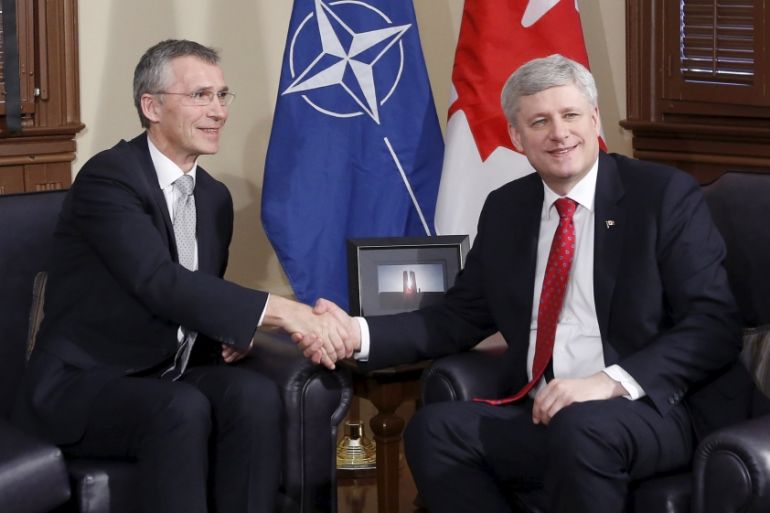Canada to expand anti-ISIL operations into Syria
Extension of military mission due to be announced by PM as UN chief says Syrians feel “increasingly abandoned”.

Canada’s prime minister will announce a one-year extension of its military mission against the Islamic State in Iraq and the Levant (ISIL) group and expand it to include air strikes on targets in Syria, according to a a senior official.
Stephen Harper will announce the extension when he presents a bill to parliament on Tuesday, the official said.
Keep reading
list of 4 itemsMoscow theatre attack suspects show signs of beating in court
Four men showing signs of severe beating charged over Moscow concert attack
Russia mourns Moscow concert hall attack victims as death toll rises to 137
“Continuing to degrade ISIL will require striking its operations and infrastructure where they are located, including in Syria,” says the motion, which was seen by the AP news agency.
Although the Canadian mission does not need parliamentary approval, the government is submitting it to a vote to show consensus.
Canadian air strikes have so far been limited to Iraq where the country has sent 69 special forces soldiers to train Kurdish peshmerga soldiers.
The Canadians’ efforts complement those of the US, which has conducted the vast majority of the air strikes against ISIL.
Canada will be the first NATO country, other than the US, to conduct air strikes in Syria. Bahrain, Saudi Arabia, Jordan and the UAE have also carried out air strikes in Syria.
Syrians ‘abandoned’
The move by Canada comes amid a warning by Ban Ki-moon, UN secretary-general, that Syrians feel “increasingly abandoned” by the international community as global attention focuses on fighting ISIL.
Ban said a lack of accountability during the four-year civil war has also led to a rise in allegations of war crimes, crimes against humanity and other abuses.
“While global attention is focused on the threat to regional and international peace and security which terrorist groups such as ISIL and the Nusra Front pose, our focus must continue to be on how best to help and support the Syrian people,” Ban said in his monthly report, which was seen by the Reuters news agency.
|
|
Ban added that more than 220,000 people have been killed since security forces cracked down on a pro-democracy movement in 2011. Some four million Syrians have fled the country and 7.6 million are internally displaced.
Ban said the situation for about 4.8 million people in hard-to-reach areas, especially 212,000 people in besieged areas, was of “grave concern,” hospitals and schools are being attacked, and international aid funding has failed to keep pace with needs.
The UN is seeking some $8.4bn to meet the humanitarian needs of the Syrian conflict in 2015, after only securing about half the funding it asked for in 2014.
ISIL seized vast amounts of territory in Syria and Iraq by capitalising on the instability caused by the respective conflicts in both countries.
Momentum has, however, tilted against them since the start of US-led air strikes after its rapid gains in Iraq last year.
The focus on ISIL has allowed other groups, such as the Nusra Front, to expand their territory and numbers, according to some analysts.
The group, once allied with ISIL, split after an attempt to forcibly merge the groups by ISIL’s leader, Abu Bakr al-Baghdadi.
The Nusra Front has since worked with other factions against Baghdadi’s fighters, but has also been involved in wrestling territory from other rebel factions, including ones backed by the US, such as Harakat Hazm.
The group now controls territory in Idlib, Hama and the Golan Heights, bordering territory currently occupied by Israel.
Public lashings
An opposition activist in Kafranbel, a town in Idlib, said the Nusra Front has established an elaborate network of social services and Islamic law courts and rules uncontested.
|
|
Remaining rebel groups in the province operate only with Nusra’s approval, he said.At the same time, the Nusra Front has become increasingly aggressive towards local populations.
In January, members of the group reportedly shot a woman dead in front of a crowd in Idlib after they accused her of being a prostitute.
The group also has carried out public lashings, crucifixions and kidnappings – though it has not publicised the atrocities like ISIL.
Activists in southern Syria say the Nusra Front was behind the January bombing that destroyed the shrine of a 13th century Muslim scholar.
Nusra issued a statement denying it was involved but activists say its members were seen placing the bombs.